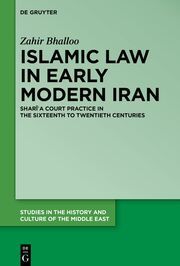Islamic Law in Early Modern Iran
Lieferzeit: 5 Werktage(inkl . Versand)
Historical studies on the practice of Islamic law (shara) tend to focus on practice in a Sunni setting during the Mamluk or Ottoman periods. This book decenters Sunni and Mamluk and Ottoman normativity by investigating the practice of shara in a Twelver Shii Persian-speaking milieu, in early modern Iran between the sixteenth to twentieth centuries. Drawing on documentary evidence and narrative sources, it reconstructs who the practitioners of Islamic law were, how they authenticated, annulled, and archived legal documents, and how they intervened in the resolution of disputes over religious endowments (waqf). The study demonstrates that following Iran's conversion to Twelver Shiism under the Safavids, the dominance of Ul Shii legal theory, which conferred judicial authority on scholars recognized as Shii jurists (mujathids), affected both the practitioners of Islamic law and the procedures of shara court practice in Iran. Shii jurists in Iran, as a result, would come to exercise by the end of the nineteenth century a judicial monopoly over valid shara court practice thus laying the foundation for Ayatollah Khomeini's extension, during the Iranian revolution, of the authority of the Shii jurist over political affairs.
Zahir Bhalloo, Centre for the Study of Manuscript Cultures, Universität Hamburg, Germany.
| Autor | Bhalloo, Zahir |
|---|---|
| Verlag | De Gruyter GmbH |
| ISBN | 9783111236582 |
| ISBN/EAN | 9783111236582 |
| Lieferzeit | 5 Werktage(inkl . Versand) |
| Erscheinungsdatum | 04.05.2023 |
| Lieferbarkeitsdatum | 03.11.2023 |
| Einband | Gebunden |
| Format | 2 x 23.5 x 16.5 |
| Seitenzahl | XVIII, 304 S., 14 s/w Illustr., 54 farbige Illustr., 10 s/w Tab., 14 b/w and 54 col. ill., 10 b/w tbl. |
| Gewicht | 572 |
Weitere Informationen
| Verlag | De Gruyter GmbH |
|---|---|
| ISBN | 9783111236582 |
| Erscheinungsdatum | 04.05.2023 |
| Einband | Gebunden |
| Format | 2 x 23.5 x 16.5 |
| Gewicht | 572 |
Historical studies on the practice of Islamic law (shara) tend to focus on practice in a Sunni setting during the Mamluk or Ottoman periods. This book decenters Sunni and Mamluk and Ottoman normativity by investigating the practice of shara in a Twelver Shii Persian-speaking milieu, in early modern Iran between the sixteenth to twentieth centuries. Drawing on documentary evidence and narrative sources, it reconstructs who the practitioners of Islamic law were, how they authenticated, annulled, and archived legal documents, and how they intervened in the resolution of disputes over religious endowments (waqf). The study demonstrates that following Iran's conversion to Twelver Shiism under the Safavids, the dominance of Ul Shii legal theory, which conferred judicial authority on scholars recognized as Shii jurists (mujathids), affected both the practitioners of Islamic law and the procedures of shara court practice in Iran. Shii jurists in Iran, as a result, would come to exercise by the end of the nineteenth century a judicial monopoly over valid shara court practice thus laying the foundation for Ayatollah Khomeini's extension, during the Iranian revolution, of the authority of the Shii jurist over political affairs.
Zahir Bhalloo, Centre for the Study of Manuscript Cultures, Universität Hamburg, Germany.
Kategorie

